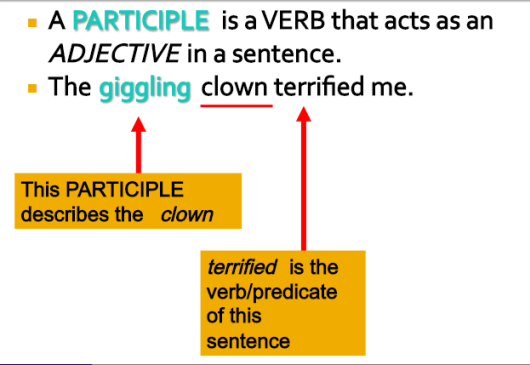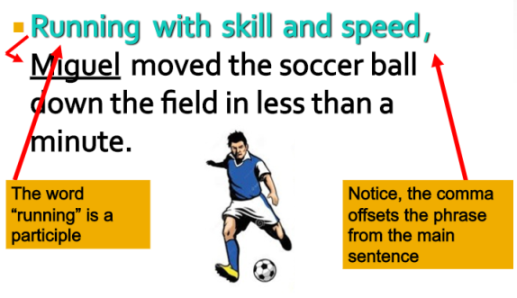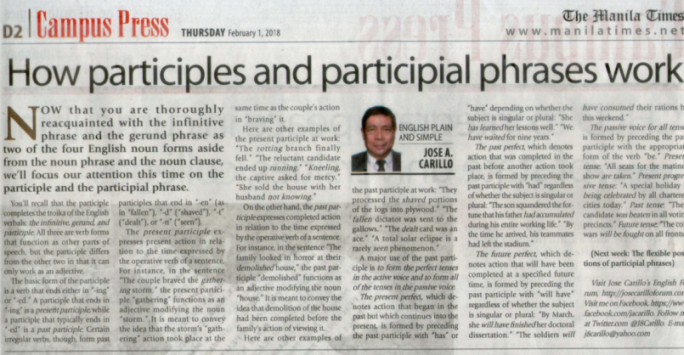Now that you are thoroughly reacquainted with the infinitive phrase and the gerund phrase as two of the four English noun forms aside from the noun phrase and the noun clause, we’ll focus our attention this time on the participle and the participial phrase.
THE PARTICIPLE CAN ONLY WORK AS AN ADJECTIVE OR ADJECTIVAL MODIFIER
You’ll recall that the
participle completes the troika of the English verbals: the
infinitive,
gerund, and
participle. All three are verb forms that function as other parts of speech, but the participle differs from the other two in that it can only work as an adjective.
The basic form of the participle is a verb that ends either in “-ing” or “-ed.” A participle that ends in “-ing” is a
present participle, while a participle that typically ends in “-ed” is a
past participle. Certain irregular verbs, though, form past participles that end in “-en” (as in “fallen”), “-d” (“shaved”), “-t” (“dealt”), or “-n” (“seen”).
The
present participle expresses present action in relation to the time expressed by the operative verb of a sentence. For instance, in the sentence “The couple braved the
gathering storm,” the present participle “gathering” functions as an adjective modifying the noun “storm.” It is meant to convey the idea that the storm’s “gathering” action took place at the same time as the couple’s action in “braving” it.

THE PARTICIPLE AT WORK AS ADJECTIVE

THE PARTICIPIAL PHRASE AT WORK AS MODIFIER
CREDIT FOR ALL THREE IMAGES IN THIS POSTING: SLIDEPLAYER.COMHere are other examples of the present participle at work: “The
rotting branch finally fell.” “The reluctant candidate ended up
running.” “
Kneeling, the captive asked for mercy.” “She sold the house with her husband
not knowing.”
On the other hand, the
past participle expresses completed action in relation to the time expressed by the operative verb of a sentence. For instance, in the sentence “The family looked in horror at their
demolished house,” the past participle “demolished” functions as an adjective modifying the noun “house.” It is meant to convey the idea that demolition of the house had been completed before the family’s action of viewing it.
Here are other examples of the past participle at work: “They processed the
shaved portions of the logs into plywood.” “The
fallen dictator was sent to the gallows.” “The
dealt card was an ace.” “A total solar eclipse is a rarely
seen phenomenon.”
A major use of the past participle is to form the perfect tenses in the active voice and to form all of the tenses in the passive voice. The
present perfect, which denotes action that began in the past but which continues into the present, is formed by preceding the past participle with “has” or “have” depending on whether the subject is singular or plural: “She
has learned her lessons well.” “We
have waited for nine years.”
The
past perfect, which denotes action that was completed in the past before another action took place, is formed by preceding the past participle with “had” regardless of whether the subject is singular or plural: “The son squandered the fortune that his father
had accumulated during his entire working life.” “By the time he arrived, his teammates
had left the stadium.”
The
future perfect, which denotes action that will have been completed at a specified future time, is formed by preceding the past participle with “will have” regardless of whether the subject is singular or plural: “By March, she
will have finished her doctoral dissertation.” “The soldiers
will have consumed their rations by this weekend.”
The passive voice for all tenses is formed by preceding the past participle with the appropriate form of the verb “be.” Present tense: “All seats for the matinee show
are taken.”
Present progressive tense: “A special holiday
is being celebrated by all chartered cities today.”
Past tense: “Their candidate
was beaten in all voting precincts.”
Future tense: “The cola wars
will be fought on all fronts.”
This essay, 1077th in the series, appeared in the column “English Plain and Simple” by Jose A. Carillo in the Campus Press section of the February 1, 2018 issue (print edition only) of The Manila Times
, © 2018 by the Manila Times Publishing Corp. All rights reserved.
(Next:
The flexible positions of participial phrases)